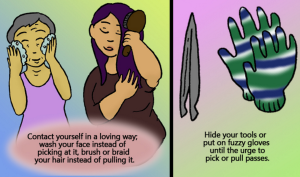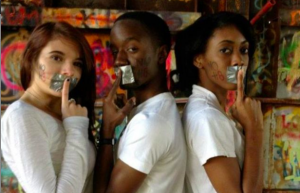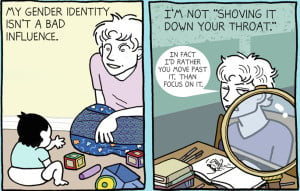
Source: Wefulness
Originally published on Feminspire and cross-posted here with their permission.
When you’re depressed, anxious, abused, and/or have been isolated your whole life, it’s easy to feel like other people can’t really ever get close.
It’s hard to imagine closeness when all you’ve experienced is alienation and loneliness.
You might just become abusive yourself, which just continues your own isolation. But sometimes, in an attempt to subvert this cycle of abuse, that isolation leads to you mistaking other people’s respect for your boundaries for them not liking you.
You start to believe that people are keeping you at an arm’s distance, when really, you’re just sending “Ah, stay away! I’m uncomfortable!” vibes by accident.
You are so uncomfortable with the idea of having what you want socially and/or romantically and/or sexually, you push people away, and the “keepers” respect that.
I realized the other day that I am not comfortable being physically close, even with my close friends who are really touchy and cuddly. I just feel like it’s inappropriate even when I know that it is appropriate to be physically close to them.
So instead of attempting an intimate relationship of any kind, I generally alienate people who respect my boundaries because I am uncomfortable with having the connections I want.
People pick up on that discomfort and back off.
You might do this too, and the cool people you want to be close to are respecting your boundaries by staying away.
Of course, some people don’t care about boundaries.
And some people will forge relationships despite your discomfort, and you’re thankful because you don’t realize you sent out the “get away from me” vibe this whole time and they ignored it.
Everything is great. They like you. They spend time with you. You have a close relationship! It’s fantastic.
Until they cross a real, deliberate boundary.
And then you’re scared.
And then, if you have managed to get healthy enough about relationships, you cut them out of your life when that disregard for your boundaries becomes consistent and upsetting.
But then, once again, you’re alone.
And you wonder why no nice, respectful people like you enough to get intimately close. And then you think, once again, it was all true. There is something intrinsically wrong with you.
So you keep keeping “normal” people at a distance, because you think they are “too good” for you. Because you think they should push the relationship to show they really want you around. And nice people keep respecting your distance, and abusive people keep ignoring it. And you continue hating yourself, and maybe the world, for it.
This is how abusive families and/or abusive early peer relationships send us on a seemingly endless cycle of loneliness.
So how can we fight this process and end the cycle?
Well, there are three options that I’ve seen for responding to this cycle.
The first bad option is what I’ve been describing: assuming that if a person wants you around, they will ask you to be around them over and over and over despite your pushing them away.
Basically, you expect others to harass you with their friendship. This doesn’t work because it only hurts you with loneliness and acceptance of abusive relationships.
The second bad option, which sadly, I’ve seen a lot of people take, is to do the exact opposite.
This is to force intimacy and time and contact on other people. You assume that whatever person you’re imposing yourself on will harass you to leave them alone if they need space. You put all of the pressure to create boundaries on the other person.
This might temporarily get you more time with people, but doesn’t lead to anything ultimately enjoyable.
It is abusive, and eventually you end up alone again and feeling bad about yourself once those people run away from you.
For many of us, it feels like those are the only two options: 1) to be “sensitive to others” by waiting for others to smash through your boundaries, assuming everyone doesn’t want to be around you until proven otherwise; or 2) to smash through others’ boundaries, assuming everyone dislikes you and the ones who dislike you the least will let you be around them.
There is a third option. There is real solution that I’ve finally realized exists.
Just ask.
Ask everyone, over and over, until you’re comfortable reading cues and judging desire for intimacy. Ask after that, too – because it can’t hurt.
We who come from abuse (or who haven’t learned good social skills) see other people happy and not lonely and assume that it just happened.
Well, no.
All of those happy people started those relationships by asking, trying, and respecting.
So ask.
Ask, “Do you want to hang out sometime?”Ask, “Would you like to go on a date?”Ask, “Is it okay to…? Do you want to…? Would you like…?”
And if the person says yes, accept it!
And when they ask you something and you want to say yes, say yes!
If you feel that someone wants to hang out more or kiss you or be a couple or non-sexually cuddle, but you can’t tell, ask! Ask even if you’re sure. It doesn’t hurt.
Other people didn’t “just get it,” in terms of how to be intimate. They asked.
What you observe is the end product of accepting the closeness of others. It’s the end product of guessing and then validating those guesses with questions.
Not knowing what healthy boundaries look like doesn’t have to mean loneliness.
It just means a lot more questions that people are usually happy to answer. It means trying again and again. It means learning the social rules from scratch.
But all that does is make you even more deliberate and appreciative of boundaries, once you get the hang of them.
You make your real boundaries important to you. You eliminate the unconscious, unintentional boundaries you place. You learn to ask people what they are comfortable with. You let people in.
Socializing is really freaking hard for people who’ve had nothing but abuse. And we keep waiting for someone healthy to save us. But they can’t do that.
They are, by definition, too busy respecting our space. The only way to eliminate that space is to take down our walls and ask others inside.
Some bad people will still get in. People will still reject us. Occasionally, we will still cross a line. But as long as we realize that we deserve better and cut the bad people out, and as long as we apologize and learn from it when we make mistakes, experimenting socially is worth it. Letting people in is worth it.
Asking people to share in our lives and forming intimate relationships is worth it, and absolutely doable, no matter your background.
[do_widget id=”text-101″]
Zeinah Zaki is an adorable, bisexual trans guy who writes, LARPs, and wears a lot of wigs. Zeinah talks about (intersectional) feminism, experiences with gender and sexuality, silly fun stuff, relationships, media, and mental illness. Follow hir on Tumblr here.
Search our 3000+ articles!
Read our articles about:
Our online racial justice training
Used by hundreds of universities, non-profits, and businesses.
Click to learn more




















